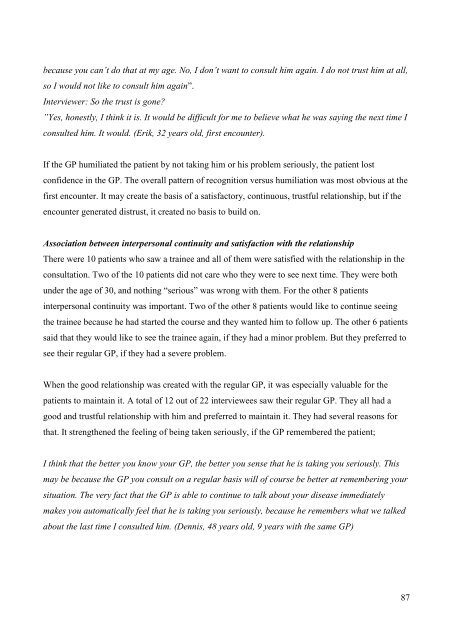Patientperspektivet på læge-patientrelationen i ... - Dagens Medicin
Patientperspektivet på læge-patientrelationen i ... - Dagens Medicin
Patientperspektivet på læge-patientrelationen i ... - Dagens Medicin
You also want an ePaper? Increase the reach of your titles
YUMPU automatically turns print PDFs into web optimized ePapers that Google loves.
ecause you can‟t do that at my age. No, I don‟t want to consult him again. I do not trust him at all,<br />
so I would not like to consult him again”.<br />
Interviewer: So the trust is gone?<br />
”Yes, honestly, I think it is. It would be difficult for me to believe what he was saying the next time I<br />
consulted him. It would. (Erik, 32 years old, first encounter).<br />
If the GP humiliated the patient by not taking him or his problem seriously, the patient lost<br />
confidence in the GP. The overall pattern of recognition versus humiliation was most obvious at the<br />
first encounter. It may create the basis of a satisfactory, continuous, trustful relationship, but if the<br />
encounter generated distrust, it created no basis to build on.<br />
Association between interpersonal continuity and satisfaction with the relationship<br />
There were 10 patients who saw a trainee and all of them were satisfied with the relationship in the<br />
consultation. Two of the 10 patients did not care who they were to see next time. They were both<br />
under the age of 30, and nothing “serious” was wrong with them. For the other 8 patients<br />
interpersonal continuity was important. Two of the other 8 patients would like to continue seeing<br />
the trainee because he had started the course and they wanted him to follow up. The other 6 patients<br />
said that they would like to see the trainee again, if they had a minor problem. But they preferred to<br />
see their regular GP, if they had a severe problem.<br />
When the good relationship was created with the regular GP, it was especially valuable for the<br />
patients to maintain it. A total of 12 out of 22 interviewees saw their regular GP. They all had a<br />
good and trustful relationship with him and preferred to maintain it. They had several reasons for<br />
that. It strengthened the feeling of being taken seriously, if the GP remembered the patient;<br />
I think that the better you know your GP, the better you sense that he is taking you seriously. This<br />
may be because the GP you consult on a regular basis will of course be better at remembering your<br />
situation. The very fact that the GP is able to continue to talk about your disease immediately<br />
makes you automatically feel that he is taking you seriously, because he remembers what we talked<br />
about the last time I consulted him. (Dennis, 48 years old, 9 years with the same GP)<br />
87








